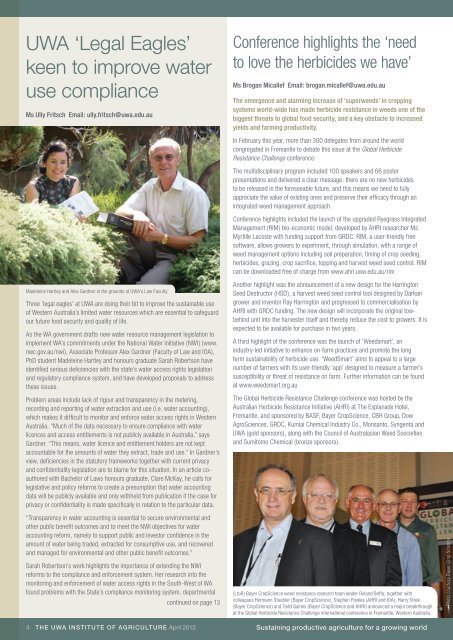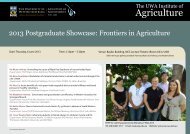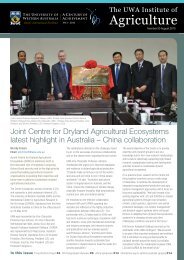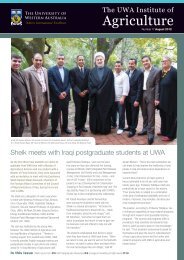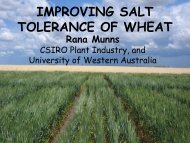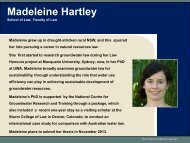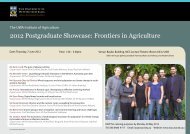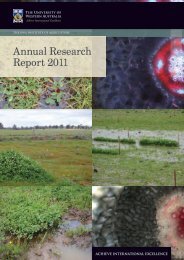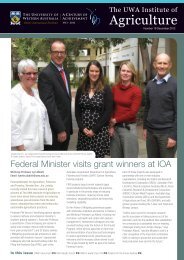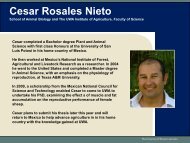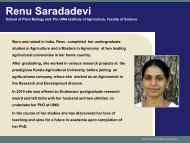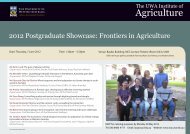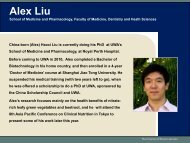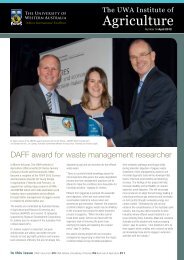Download - The UWA Institute of Agriculture - The University of ...
Download - The UWA Institute of Agriculture - The University of ...
Download - The UWA Institute of Agriculture - The University of ...
Create successful ePaper yourself
Turn your PDF publications into a flip-book with our unique Google optimized e-Paper software.
<strong>UWA</strong> ‘Legal Eagles’<br />
keen to improve water<br />
use compliance<br />
Ms Ully Fritsch Email: ully.fritsch@uwa.edu.au<br />
Conference highlights the ‘need<br />
to love the herbicides we have’<br />
Ms Brogan Micallef Email: brogan.micallef@uwa.edu.au<br />
<strong>The</strong> emergence and alarming increase <strong>of</strong> ‘superweeds’ in cropping<br />
systems world-wide has made herbicide resistance in weeds one <strong>of</strong> the<br />
biggest threats to global food security, and a key obstacle to increased<br />
yields and farming productivity.<br />
In February this year, more than 300 delegates from around the world<br />
congregated in Fremantle to debate this issue at the Global Herbicide<br />
Resistance Challenge conference.<br />
<strong>The</strong> multidisciplinary program included 100 speakers and 66 poster<br />
presentations and delivered a clear message: there are no new herbicides<br />
to be released in the foreseeable future, and this means we need to fully<br />
appreciate the value <strong>of</strong> existing ones and preserve their efficacy through an<br />
integrated weed management approach.<br />
Conference highlights included the launch <strong>of</strong> the upgraded Ryegrass Integrated<br />
Management (RIM) bio-economic model, developed by AHRI researcher Ms<br />
Myrtille Lacoste with funding support from GRDC. RIM, a user-friendly free<br />
s<strong>of</strong>tware, allows growers to experiment, through simulation, with a range <strong>of</strong><br />
weed management options including soil preparation, timing <strong>of</strong> crop seeding,<br />
herbicides, grazing, crop sacrifice, topping and harvest weed seed control. RIM<br />
can be downloaded free <strong>of</strong> charge from www.ahri.uwa.edu.au/rim<br />
Madeleine Hartley and Alex Gardner in the grounds at <strong>UWA</strong>’s Law Faculty.<br />
Three ‘legal eagles’ at <strong>UWA</strong> are doing their bit to improve the sustainable use<br />
<strong>of</strong> Western Australia’s limited water resources which are essential to safeguard<br />
our future food security and quality <strong>of</strong> life.<br />
As the WA government drafts new water resource management legislation to<br />
implement WA’s commitments under the National Water Initiative (NWI) (www.<br />
nwc.gov.au/nwi), Associate Pr<strong>of</strong>essor Alex Gardner (Faculty <strong>of</strong> Law and IOA),<br />
PhD student Madeleine Hartley and honours graduate Sarah Robertson have<br />
identified serious deficiencies with the state’s water access rights legislation<br />
and regulatory compliance system, and have developed proposals to address<br />
these issues.<br />
Problem areas include lack <strong>of</strong> rigour and transparency in the metering,<br />
recording and reporting <strong>of</strong> water extraction and use (i.e. water accounting),<br />
which makes it difficult to monitor and enforce water access rights in Western<br />
Australia. “Much <strong>of</strong> the data necessary to ensure compliance with water<br />
licences and access entitlements is not publicly available in Australia,” says<br />
Gardner. “This means, water licence and entitlement holders are not kept<br />
accountable for the amounts <strong>of</strong> water they extract, trade and use.” In Gardner’s<br />
view, deficiencies in the statutory frameworks together with current privacy<br />
and confidentiality legislation are to blame for this situation. In an article coauthored<br />
with Bachelor <strong>of</strong> Laws honours graduate, Clare McKay, he calls for<br />
legislative and policy reforms to create a presumption that water accounting<br />
data will be publicly available and only withheld from publication if the case for<br />
privacy or confidentiality is made specifically in relation to the particular data.<br />
“Transparency in water accounting is essential to secure environmental and<br />
other public benefit outcomes and to meet the NWI objectives for water<br />
accounting reform, namely to support public and investor confidence in the<br />
amount <strong>of</strong> water being traded, extracted for consumptive use, and recovered<br />
and managed for environmental and other public benefit outcomes.”<br />
Sarah Robertson’s work highlights the importance <strong>of</strong> extending the NWI<br />
reforms to the compliance and enforcement system. Her research into the<br />
monitoring and enforcement <strong>of</strong> water access rights in the South-West <strong>of</strong> WA<br />
found problems with the State’s compliance monitoring system, departmental<br />
continued on page 13<br />
Another highlight was the announcement <strong>of</strong> a new design for the Harrington<br />
Seed Destructor (HSD), a harvest weed seed control tool designed by Darkan<br />
grower and inventor Ray Harrington and progressed to commercialisation by<br />
AHRI with GRDC funding. <strong>The</strong> new design will incorporate the original towbehind<br />
unit into the harvester itself and thereby reduce the cost to growers. It is<br />
expected to be available for purchase in two years.<br />
A third highlight <strong>of</strong> the conference was the launch <strong>of</strong> ‘Weedsmart’, an<br />
industry-led initiative to enhance on-farm practices and promote the long<br />
term sustainability <strong>of</strong> herbicide use. ‘WeedSmart’ aims to appeal to a large<br />
number <strong>of</strong> farmers with its user-friendly ‘app’ designed to measure a farmer’s<br />
susceptibility or threat <strong>of</strong> resistance on farm. Further information can be found<br />
at www.weedsmart.org.au<br />
<strong>The</strong> Global Herbicide Resistance Challenge conference was hosted by the<br />
Australian Herbicide Resistance Initiative (AHRI) at <strong>The</strong> Esplanade Hotel,<br />
Fremantle, and sponsored by BASF, Bayer CropScience, CBH Group, Dow<br />
AgroSciences, GRDC, Kumiai Chemical Industry Co., Monsanto, Syngenta and<br />
<strong>UWA</strong> (gold sponsors), along with the Council <strong>of</strong> Australasian Weed Soecieties<br />
and Sumitomo Chemical (bronze sponsors).<br />
(LtoR) Bayer CropScience weed resistance research team leader Roland Beffa, together with<br />
colleagues Hermann Stuebler (Bayer CropScience), Stephen Powles (AHRI and IOA), Harry Strek<br />
(Bayer CropScience) and Todd Gaines (Bayer CropScience and AHRI) announced a major breakthrough<br />
at the Global Herbicide Resistance Challenge international conference in Fremantle, Western Australia.<br />
Photo courtesy Bayer Crop Science<br />
4 THE <strong>UWA</strong> institute <strong>of</strong> agriculture April 2013 Sustaining productive agriculture for a growing world


